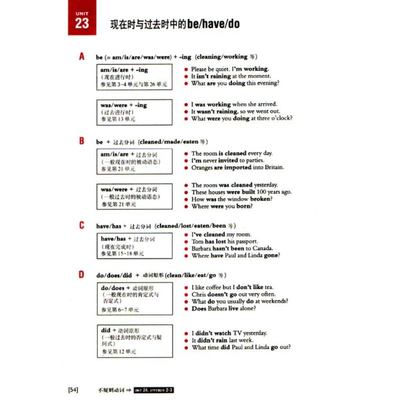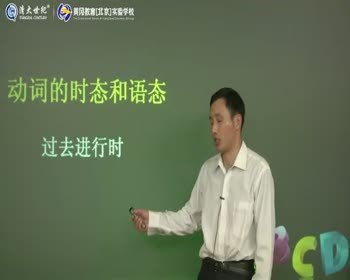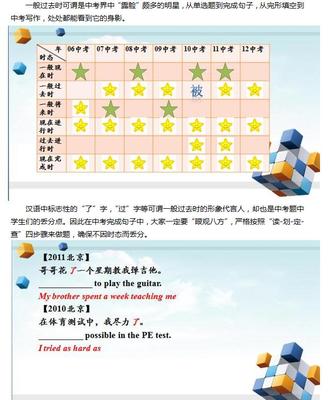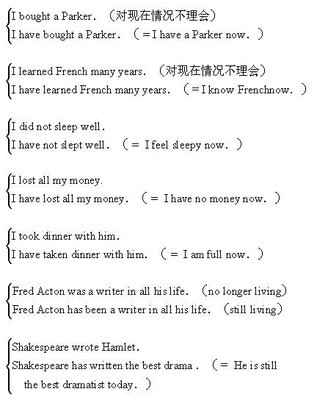一般将来时
一、用will或shall表示。
“助动词will或shall+动词原形”这一形式,但shall仅表示单纯将来时,用于第一人称I和we表示将来发生的事情,用于征求对方的意见或表示客气的邀请。在口语中will用于所有人称,书面语中第一人称常用shall.如:
1. Tomorrow will be Sunday. 明天就是星期天。
2. The rain will stop soon. 雨很快就要停了。
3. Shall we go there at five? 我们五点钟去那儿,好吗?
4. Will you please open the door? 请你把门打开,好吗?
will,shall可用来预言将来发生的事。如说出我们设想会发生的事,或者请对方预言将要发生什么事。例如:
It will rain tomorrow. 明天将要下雨。
will,shall除可表示单纯的将来时以外,还可以带有意愿的色彩,仍指的是将来。例如:
I'll buy you a bicycle for your birthday.你过生日时,我给你买一辆自行车。(表示允诺)
Will you open the door for meplease?请你帮我开门好吗?(表示请求)
Shall I get your coat for you?我可以为你拿外套吗?(表示提议)
二、用be goingto结构表示。
1.表示说话人根据现在已有的迹象,判断将要或即将发生某种情况。这类句子的主语可以是人,也可是物。例如:
There is going to be a football match in our schooltomorrow afternoon. 明天下午我们学校将有一场足球赛
(已有告示)
I feel terrible.I think I'm going to die.我感到难受极了,我想我快不行了。
Look at those black clouds!It's going to rain.看看那些乌云!天快要下雨了。
2.表示主语现在的意图或现已作出的决定,即打算在最近或将来进行某事。这种意图或决定往往是事先经过考虑的。例如:
He isn't going to see his elder brothertomorrow. 他明天不准备去看他哥哥。
Mary is going to be a teacher when she growsup. 玛丽决定长大了当一名教师。
3.只是单纯地预测未来的事,此时可与will互换。例如:
I think it is going to/will rain this evening.我认为今晚要下雨。
注意:
(1)be goingto和will在含义和用法上略有不同。be goingto往往表示事先经过考虑的打算;will多表示意愿、决心。两者有时不能互换。例如:
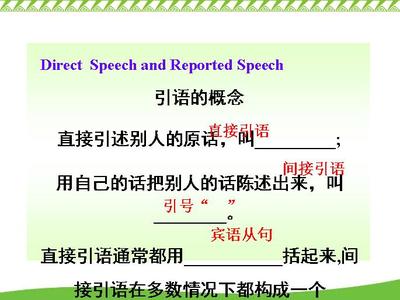
He is studying hard and is going to try for theexams. 他正努力学习,准备参加考试。(不能用will替换)
—Can somebody help me?——谁能帮我一下吗?
—I will. ——我来。(不能用be going to替换) 1. We’regoing to meet outside the school gate. 我们打算在校门口见面。
Look! It’s going to rain. 瞧!快下雨了。
三、用现在进行时表示。
表示位置转移的动词(如go,come,leave,start,arrive,return,send,move,travel,fly等)和其它几个动作动词(如do,begin,work,spend,play,stay,happen,have,finish,join,eat,die,meet等)常与现在进行时和表示将来的时间状语连用,表示在最近将要发生某事。这些事是事先安排好的。例如:
The Browns are coming to dinner tomorrow.明天布朗夫妇要来吃晚饭。
What are you doing tomorrow?明天你做什么?
The train is arriving at nine o'clock.火车将在九点钟到。
在特定的上下文中,这类动词有时也可不带时间状语。例如:
—Come to school in your old clothes tomorrow . ——明天穿你的旧衣服来上学。
—Why?What's happening?——为什么?有什么事?
四、用一般现在时表示。
1.动词be;表示位置转移的动词(如go,come,arrive,leave,return等
|
)和表示“开始,结束”的动词(如start,begin,open,finish,end,close等)与一般现在时和表示将来的时间状语连用,表示时间表、节目单或日程表上所安排好的动作或事态将要发生,日程不易改变,口气肯定。例如:
School finishes on January 18th.学期一月十八日结束。
Are you free next Tuesday evening?下周二晚上你有空吗?
The party starts at four thirty,doesn't it?晚会四点半开始,是吗?
Mr Green leaves Beijing for home tomorrow.格林先生定于明天离京返家。
2. 在由when,before,as soonas,until/till引导的时间状语从句和由if引导的条件状语从句中,常用一般现在时表示将来。例如:
If it doesn't rain tomorrow,we’ll go to theEast Lake. 如果明天不下雨,我们就去东湖。
I must finish my homework before my motherreturns. 我必须在妈妈回来之前做完家庭作业。
3.在hope后接表示将来时间的宾语从句中,也可用一般现在时代替一般将来时,hope的主语往往是第一人称。例如:
I hope you(will)have a good holiday.我希望你假日愉快。
I hope he comes(will come). 我希望他会来。
五、用“be+动词不定式”或用“beabout to+动词原形”的结构表示。
如:
1. He is to visit Japan next year. 明年他将访问日本。
2. They’re about to leave. (=They’re leaving.)他们就要走了。
一般将来时专项练习
一、单项选择。
1. There __________ a meetingtomorrow afternoon.
A. will be goingtoB. will going to be C. is goingto be D. will go to be
2. Charlie ________ here nextmonth.
A. isn’tworkingB. doesn’t working
C. isn’t going toworkingD. won’t work--
3. He ________ very busy thisweek, he ________ free next week.
A. will be;isB. is; is C.will be; will be D. is; will be
4. There ________ a dolphin showin the zoo tomorrow evening.
A.wasB. is going to haveC. willhaveD. is goingto be
5. –________ you ________ freetomorrow?
– No. I ________ free the day after tomorrow.
A. Are; going to;willB. Are; going to be; will C.Are; going to; will be D. Are; going to be; will be
6. Mother ________ me a nicepresent on my next birthday.
A. willgives B. willgive C.givesD. give
7. – Shall I buy a cup of teafor you?
–________. (不,不要。)
A. No, youwon’t.B. No, you aren’t.C. No,please don’t. D. No,please.
8. – Where is the morningpaper?
– I ________ if for you at once.
A.getB. am gettingC. to getD. will get
9. ________ a concert nextSaturday?
A. There willbe B. Willthere be C. There can beD.There are
10. If they come, we ________ a meeting.
A. have B. willhave C.hadD. would have
11. He ________ her a beautiful hat on her nextbirthday.
A.givesB.gave C. will givingD. is going to giving
12. He ________ to us as soon as he gets there.
A.writesB. has written C. will writeD. wrote
13. He ________ in three days.
A. comingback B. cameback C. will come backD. is going to coming back
14. If it ________ tomorrow, we’ll goroller-skating.
A. isn’t rain B. won’train C. doesn’train D. doesn’t fine
15. – Will his parents go to see the Terra CottaWarriors tomorrow?
– No, ________(不去).
A. theywilln’t. B. they won’t.C. theyaren’t. D. they don’t.
16. Who ________ we ________ swimming with tomorrowafternoon?
A. will;go B. do;goC. will; going D. shall; go
17. We ________ the work this way next time.
A.doB. will doC. going to doD. will doing
18. Tomorrow he ________ a kite in the open airfirst, and then ________ boating in the park.
A. will fly;will go B.will fly; goesC. is going to fly; will goesD. flies; will go
19. The day after tomorrow they ________ avolleyball match.
A. willwatching B. watchesC. iswatching D.is going to watch
20. There ________ a birthday party thisSunday.
A. shallbeB. will beC. shall going to beD. will going to be
21. They ________ an English evening nextSunday.
A. arehaving B. aregoing to haveC. will havingD. is going to have
22. ________ you ________ free next Sunday?
A. Will; areB. Will; beC. Do;beD. Are; be
23. He ________ there at ten tomorrow morning.
A.willB. is C. willbe D. be
24. ________ your brother ________ a magazine fromthe library?
A. Are; going to borrowB. Is; going to borrowC. Will;borrows D. Are; going to borrows
25. – Shall I come again tomorrow afternoon?
–________ (好的).
A. Yes, pleaseB. Yes, you will. C. No, please.D. No, youwon’t.
26. It ________ the year of the horse nextyear.
A. is going tobe B. is going toC. will beD. willis
27. ________ open the window?
A. Will youplease B. Please will you C.You please D. Do you
28. – Let’s go out to play football, shallwe?
– OK. I________.
A. willcoming B. begoing to come C.come D. amcoming
29. It ________ us a long time to learn Englishwell.
A.takesB. willtake C.spends D.will spend
30. The train ________ at 11.
A. going toarrive B. will bearrive C. is going toD. is arriving
 爱华网
爱华网